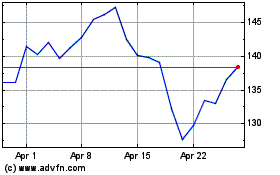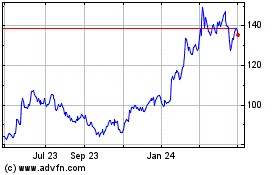U.S. Moves to Cut Off Chip Supplies to Huawei -- 2nd Update
May 15 2020 - 10:26AM
Dow Jones News
By Katy Stech Ferek
The Trump administration announced a new export restriction on
Friday designed to cut off Chinese telecom-equipment maker Huawei
Technologies Co. from overseas manufacturers who supply
semiconductors.
The restriction stops foreign semiconductor manufacturers whose
operations use U.S. software and technology from shipping products
to Huawei without getting a license from U.S. officials first.
That new license authority could give the Commerce Department
the ability to block the sale of semiconductors manufactured by
Taiwan Semiconductor Manufacturing Co., for Huawei's HiSilicon
unit, which designs chips for the company.
Commerce officials have worked on the new restriction for
months.
The restriction further tightens the U.S. export-control
system's existing rules related to Huawei. Washington alleges that
Huawei gear could be used by Beijing to spy globally, which Huawei
has repeatedly denied.
Huawei didn't immediately respond to a request for comment on
the new restriction.
China's Ministry of Commerce and Ministry of Foreign Affairs
didn't immediately respond to emailed requests for comments late
Friday.
A year ago, Commerce Department officials put Huawei on an
export blacklist that they keep of companies considered to be
national-security threats. That move was designed to cut Huawei off
from some U.S. semiconductor makers, but some manufacturers later
found loopholes in the rule that enabled them to resume shipments,
frustrating some Trump administration officials.
"This is not how a responsible global corporate citizen behaves.
We must amend our rules exploited by Huawei and HiSilicon and
prevent U.S. technologies from enabling malign activities contrary
to U.S. national-security and foreign-policy interests," said
Commerce Secretary Wilbur Ross in his announcement of the new
rule.
The move will be a likely major blow to Huawei, the world's
largest maker of telecommunications equipment and No. 2 vendor of
smartphones. Huawei in recent years has emerged as one of China's
dominant makers of semiconductors through its HiSilicon chip-design
subsidiary. Its chips are widely used across its business lines,
including in its networking base stations, smartphones and other
products.
Over the last year, Huawei has largely accommodated the Commerce
Department's entity listing through a technicality that allowed it
to buy chips from American companies--such as Qualcomm Inc. and
Intel Corp. -- that are manufactured overseas. It has also greatly
ramped up the use of HiSilicon-designed chips, primarily built by
TSMC, thereby greatly reducing its reliance on the U.S. supply
chain.
Huawei is now capable of building both 5G base-stations and
advanced smartphones free of American technology, The Wall Street
Journal reported in December.
However, the new rule effectively removes TSMC -- a Taiwanese
company -- as a supplier to Huawei, throwing into jeopardy the
ability of the company to procure advanced chips at all,
potentially affecting new smartphone launches and the delivery of
5G equipment, analysts said. Almost all HiSilicon chips are made by
TSMC using American technology, according to a report by consulting
firm Eurasia Group.
At a news conference discussing the company's annual results in
March, Eric Xu, Huawei's deputy chairman, warned that Beijing would
retaliate against American companies operating in China if the
Trump administration moved ahead with the new rule.
Hu Xijin, editor of the nationalist Global Times newspaper, in a
tweet on Friday warned that Qualcomm, Cisco Systems Inc., Apple
Inc. and Boeing Inc. could all be targets of retaliation. Mr. Hu is
typically seen as channeling the views of more hawkish members of
China's Communist Party leadership.
Write to Katy Stech Ferek at katherine.stech@wsj.com
(END) Dow Jones Newswires
May 15, 2020 10:11 ET (14:11 GMT)
Copyright (c) 2020 Dow Jones & Company, Inc.
Taiwan Semiconductor Man... (NYSE:TSM)
Historical Stock Chart
From Mar 2024 to Apr 2024

Taiwan Semiconductor Man... (NYSE:TSM)
Historical Stock Chart
From Apr 2023 to Apr 2024
